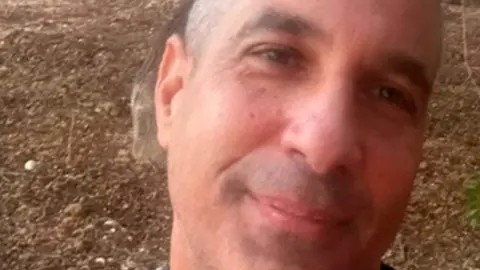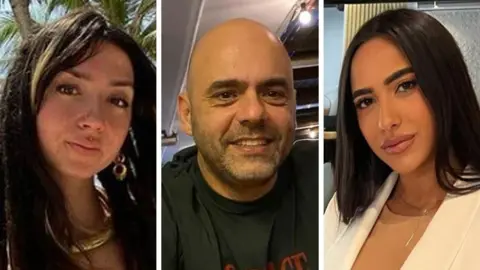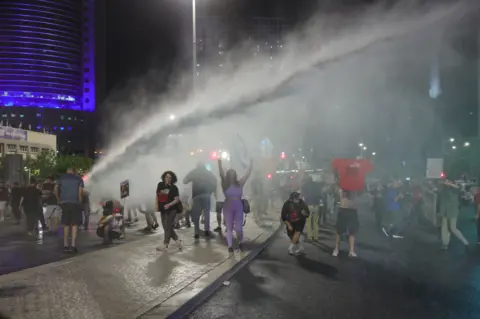Body of hostage recovered from Gaza, says IDF
 Family Handout
Family HandoutIsraeli forces have recovered the body of one of the hostages from Gaza, the Israel Defense Forces (IDF) has said.
The army confirmed that Ron Benjamin, 53, was found alongside the bodies of three other hostages whose identities were confirmed on Friday.
The 53-year-old had been taking part in a group cycle ride near the Gaza border when the Hamas attack began on 7 October.
About 1,200 people were killed during the unprecedented attack when Hamas gunmen burst into Israel. They took 252 others back to Gaza as hostages.
Israeli military spokesperson Rear Adm Daniel Hagari said in a statement posted on X that military intelligence found he was killed on 7 October.
The military said Mr Benjamin was killed at the Mefalsim intersection, and his body was "abducted to Gaza by Hamas terrorists".
Identification was carried out on Mr Benjamin's body and his family have been informed.
Mr Benjamin's family told Israeli media that he had been taking part in a group cycle ride near the Gaza border when the Hamas attack began and he decided to drive home.
The Hostages and Missing Families Forum said he was a family man - a husband and father-of-two - who loved cycling and "used to go out for a ride every Saturday, just as he did on that fateful Saturday when he was taken hostage from the Kibbutz Be’eri area".
"Ron loved traveling in Israel and around the world, and he loved music," the group said.
Mr Benjamin's body was recovered in the same operation that recovered the bodies of three other hostages - Shani Louk, Amit Buskila, and Itzhak Gelerenter.
 BRINGHOMENOW ON INSTAGRAM
BRINGHOMENOW ON INSTAGRAMThe IDF said the three victims had been killed at an intersection near the site of the Nova festival massacre in southern Israel, before their bodies were taken to Gaza.
Ms Louk - a German-Israeli citizen - had been attending the festival near the Kibbutz Re'im when gunmen opened fire and sent terrified partygoers fleeing through the desert.
An image of Ms Louk being paraded through the streets by armed fighters on a flatbed truck was circulated on social media soon after the attacks.
In October, her mother said the Israeli military had confirmed her daughter had died after a piece of her skull bone was found.
Ms Buskila was a fashion stylist and social media influencer, who had been on the phone to her uncle while trying to hide when she was kidnapped on 7 October.
Mr Gelerenter was a father and grandfather who arrived at the Nova festival only hours before the attacks began.
Under a deal agreed in November, Hamas released 105 hostages in return for a week-long ceasefire and some 240 Palestinian prisoners in Israeli jails.
It is not clear how many of those unaccounted for are still alive.
Hamas have not responded to the latest IDF announcement, but on Friday the armed wing of Hamas said the captives they hold would return only through an "honourable exchange deal for our people".
Long-running talks in Cairo aimed at securing a truce and further hostage releases are currently stalled.
 EPA
EPAOn Saturday evening, hundreds of people rallied in the Israeli capital to call on the authorities to agree to a ceasefire to bring the remaining hostages home, hold fresh elections, and for Prime Minister Benjamin Netanyahu to step down.
Some of the protesters included relatives of hostages still held in Gaza.
Yotam Cohen, whose brother Nimrod, is being held hostage in Gaza, told AFP: "We want to stop the bloodshed."
He said: "As days go, we see more and more hostages are returning in body bags and more soldiers are being killed in Gaza."
Videos and photos from Tel Aviv also show police scuffling with protesters, and using water cannon to disperse protesters who had gathered outside the Kirya military headquarters.
After the 7 October attacks, Israel launched an offensive in Gaza that has killed more than 35,000 people, mostly civilians, according to the Hamas-run health ministry.
About 2.2 million Palestinians are facing chronic food shortages and are in urgent need of shelter and other assistance, the UN says.
On Friday, the first shipment of humanitarian aid arrived in Gaza via a temporary floating pier, but governments and international groups have warned that the maritime route was not as effective as land routes.
